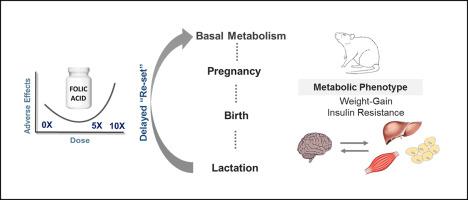The Journal of Nutritional Biochemistry ( IF 4.8 ) Pub Date : 2020-05-16 , DOI: 10.1016/j.jnutbio.2020.108414 Emanuela Pannia 1 , Neil V Yang 1 , Mandy Ho 1 , Diptendu Chatterjee 1 , Rola Hammoud 1 , Ruslan Kubant 1 , G Harvey Anderson 2

|
Maternal metabolism begins to return to homeostasis (re-set) following birth and is accelerated by lactation. Delay in metabolic re-set may contribute to postpartum weight retention and later-life metabolic consequences. Folic acid (FA) is essential during pregnancy but inadequate intakes may alter 1-carbon metabolism, consequently affecting energy homeostatic systems. Our objectives were to examine the effects of FA content 1)below and 2)above requirements during pregnancy on the re-set of body weight, markers of hepatic 1-carbon metabolism and central and peripheral energy metabolic pathways in Wistar rat mothers early post-weaning (PW) compared to pregnant controls. Pregnant Wistar rats were fed an AIN-93G diet with FA at 0X, 1X (control, 2 mg FA/kg) or a range above requirements at 2.5X, 5X or 10X recommended levels then the control diet during lactation up to 1 week PW. Dams fed below (0X) or above (5X and 10X) FA requirements had delayed weight-loss from weaning up to 1 week PW, higher plasma insulin and HOMA-IR and changes in glucose and lipid metabolism-regulating genes in muscle, but not liver or adipose tissue compared to controls. Expression of folate-related genes in liver were lower in high FA fed dams. Central food intake neurons were not affected by FA diets. In conclusion, intakes of FA below (0X) or above (5X, 10X) requirements during pregnancy delayed weight-loss, dysregulated 1-carbon pathways in the liver and peripheral energy metabolic pathways in the Wistar rat mother up to 4 weeks after dietary exposure; potentially programming long-term negative metabolic effects and that of her future offspring.
中文翻译:

怀孕期间饮食中的叶酸含量决定了Wistar大鼠大坝中新陈代谢的恢复。
出生后,母亲的新陈代谢开始恢复到稳态(重新设定),并通过泌乳而加速。代谢重置的延迟可能会导致产后体重保持和晚年代谢后果。叶酸(FA)在怀孕期间必不可少,但摄入量不足可能会改变1碳代谢,从而影响能量稳态系统。我们的目标是检查妊娠期FA含量1)低于和2)高于要求对Wistar大鼠母亲早产后体重重新设置,肝1碳代谢标记以及中枢和周边能量代谢途径的影响。断奶(PW)与孕妇对照组比较。Wistar怀胎大鼠接受AIN-93G饮食,FA分别为0X,1X(对照,2 mg FA / kg)或超出要求的2.5X 建议在哺乳期至1周PW期间使用5倍或10倍推荐水平,然后进行对照饮食。饲喂低于(0X)或高于(5X和10X)FA要求的水坝使体重减轻从断奶至1周PW延迟,较高的血浆胰岛素和HOMA-IR以及肌肉中葡萄糖和脂质代谢调节基因的变化,肝脏或脂肪组织与对照组相比。高FA饲喂大坝中肝脏中叶酸相关基因的表达较低。中枢食物摄入神经元不受FA饮食的影响。总之,怀孕期间摄入FA低于(0X)或高于(5X,10X)所需的FA会延迟体重减轻,肝脏中的Wistar大鼠母亲肝脏中的1-碳途径失调以及外围能量代谢途径失调,直至饮食暴露后4周; 可能对她的长期后代以及她的后代造成长期的负面代谢影响。











































 京公网安备 11010802027423号
京公网安备 11010802027423号